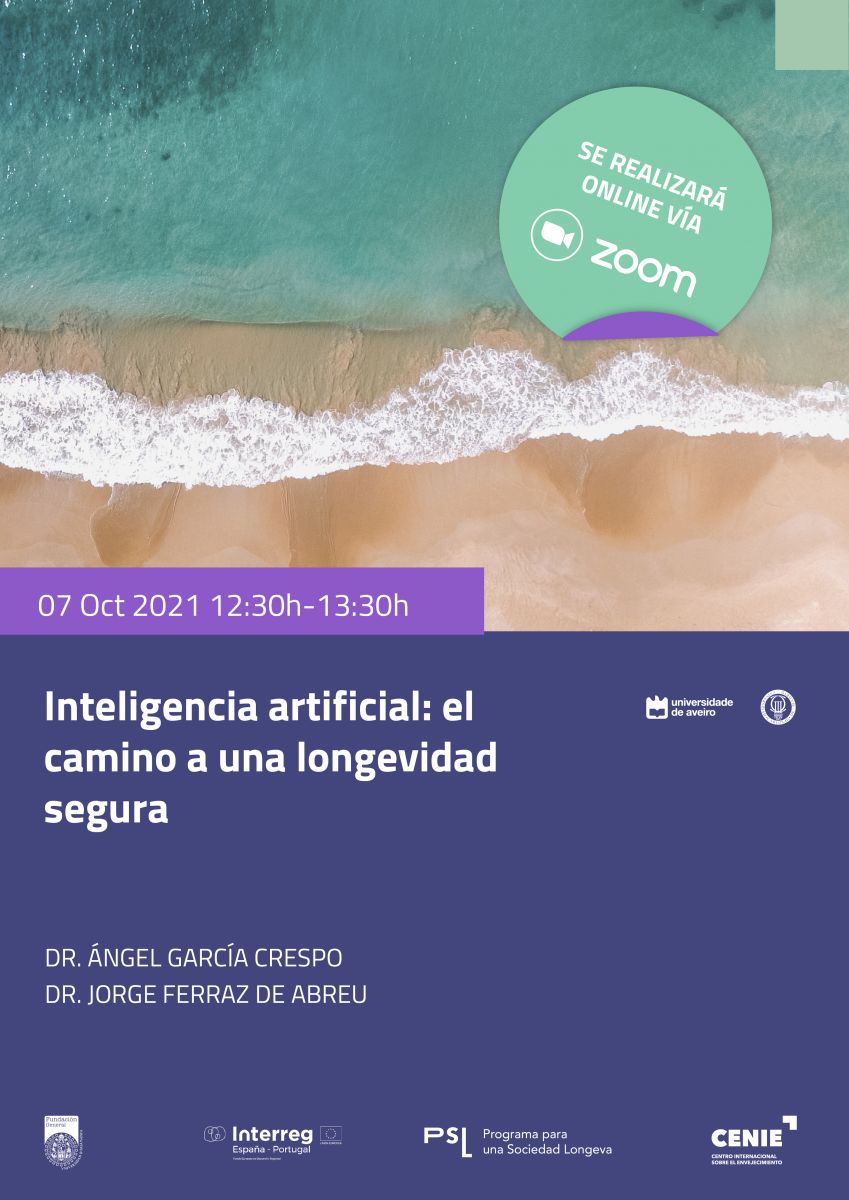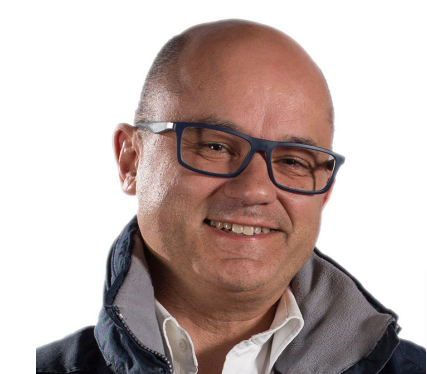Actividades
3rd Meeting - Artificial Intelligence: the road to secure longevity

ABSTRACT
The application of artificial intelligence techniques will allow things that were impossible to do until now to become feasible, generating a change like the steam engine or the internet. In our society, the number of elderly people living alone is steadily increasing, and these people are prone to suffer accidents that they cannot report. We will review the different systems that currently allow us to alleviate this situation, and we will explain how artificial intelligence techniques will allow us to develop products and services that will achieve a safer and more autonomous longevity, without losing the sociability features of our culture and guaranteeing a correct performance with the data protection established by law.
As an example, a developed non-intrusive IoT (internet of things) device will be presented, which through multiple integrated sensors, collects information about the user's usual behaviour patterns and uses it to generate rules for unusual behaviour. Using artificial intelligence techniques, alert messages can be sent to relatives or caregivers of the dependent person if their behaviour changes abruptly throughout their daily life.
SecurHome TV: monitoring the home activity of seniors via television
The SecurHome TV ecosystem aims to alert to possible risk situations in which seniors find themselves, using deviations in the pattern of their domestic activity as a starting point. The SecurHome TV ecosystem consists of three main components i) an interactive TV application that monitors, in a non-intrusive way, the interaction of the elderly with their TV; ii) a WebApp addressed to the respective caregivers, allowing them to understand the context associated with the alerts of potential risk situations they receive (by SMS or email); iii) a web management portal that schedules daily reminders to take medication, appointments and medical examinations to be the medical check-ups to be performed.
The SecurHome TV ecosystem (developed by the University of Aveiro) allows, therefore, to monitor the domestic activity of the elderly, through their normal TV, detecting deviations from their TV consumption pattern and interaction with the system, as well as delays in taking medication, which are duly weighted through a complex algorithm for issuing alerts. This poster presents the relevance of using TV as a central element in home activity and describes in detail the SecurHome TV ecosystem, with special emphasis on the alert algorithm.

Speakers:
Ángel García Crespo

D. in Industrial Engineering from the Polytechnic University of Madrid, he received that same year the J.A. Artigas Institute Award for the best doctoral thesis based on an artificial intelligence system. His work in various multinational companies since 1987 allowed him to obtain an Executive MBA from the Instituto de Empresa. He has been a professor at the Carlos III University of Madrid since 1992, and director of the 'Softlab' research group since its creation in 1994. In 2010 he was appointed by CYTED as coordinator of the Ibero-American network MELISA and in 2011 he was elected director of the Pedro Juan de Lastanosa University Institute for Technological Development and Promotion of Innovation, a position he renewed in 2015. Together with his team, he was a finalist in the Computer World Awards in the Human Services category for the system developed for accessibility to the theatre and won the prize awarded by CERMI Madrid (Prodis 2013) in the R&D&I category for the advances made in accessibility for people with sensory disabilities, he has several patents and systems in operation, as well as being co-author of more than 50 articles in indexed journals and 70 articles in other journals, He has been principal investigator in more than 100 research projects and has been the principal investigator of the SECURHOME project for the detection of behavioural changes in elderly people using non-invasive IoT (Internet of Things) systems with artificial intelligence.
Jorge Trinidad Ferraz de Abreu

Associate Professor at the University of Aveiro, Portugal. He holds a BSc and MSc in Electronics and Telecommunications Engineering (1992, 1996), a PhD in Communication Sciences and Technologies (2007), and the aggregate degree in the domain of Communication Technologies (2017), all from the University of Aveiro. After his participation in several European projects at the Department of Electronics and Telecommunications of the University of Aveiro, he joined the Department of Communication and Arts in 1996.
Currently, he teaches Communication Sciences and Technologies in the undergraduate, postgraduate and PhD courses offered by his department. He was director of the Master in Multimedia Communication (2011-14) and is Vice-Director of the PhD Programme in Information and Communication in Digital Platforms (since 2014). As a member of the DigiMedia research centre and Coordinator of the Social iTV group (http://socialitv.web.ua.pt/) he develops his activities in new media, multiplatform content and Interactive Television with special interest in the development and evaluation of user experience in social television applications, being author and co-author of more than 100 scientific publications in this field. 100 scientific publications in this field. He has been PI and scientific coordinator of a wide range of a wide range of national and international research projects in the iTV area, in collaboration with several entities, such as the Foundation for Science and Technology, the European Commission Commission, Portugal Telecom, Altran, MOG Technologies and Altice Labs. As a supervisor, he has successfully engaged his MSc, Ph.D. and PostDoc students in the aforementioned areas, deepening this type of research for specific audiences (from teenagers to seniors, including people with special needs). He is a member of several international networks of researchers, such as RedAUTI / CYTED (where he acted as National Coordinator) and the European Innovation Partnership on Active and Healthy Ageing.
He is a reviewer in several journals (e.g. International Journal of Human-Computer Interaction, Behaviour and Information Technology, Multimedia Systems Journal), and in international scientific events international scientific events (e.g. ACM TVX, HCIST, SLERD) in which he has participated as a member of their scientific committees. He has also been actively involved in the organisation of several international conferences (e.g. jAUTI'17, ACM TVX'16, EuroiTV'11) acting as Programme Chair, Track/Special Sessions. Evaluator of project management (expert in the area of Interface Challenges), and of P2020 projects. Technical Consultant in the areas of Interactive TV for the IT industry and Technical Coordinator of AlticeLabs@UA. Coordinator of the AlticeLabs@UA laboratory.
